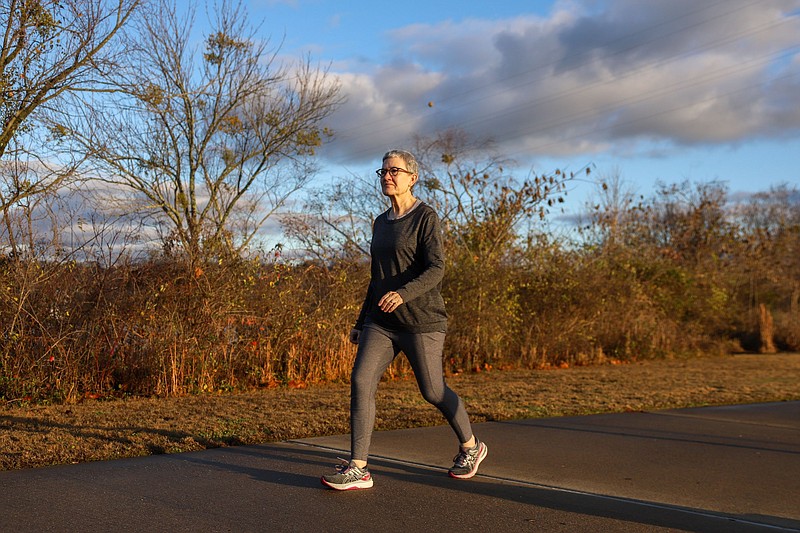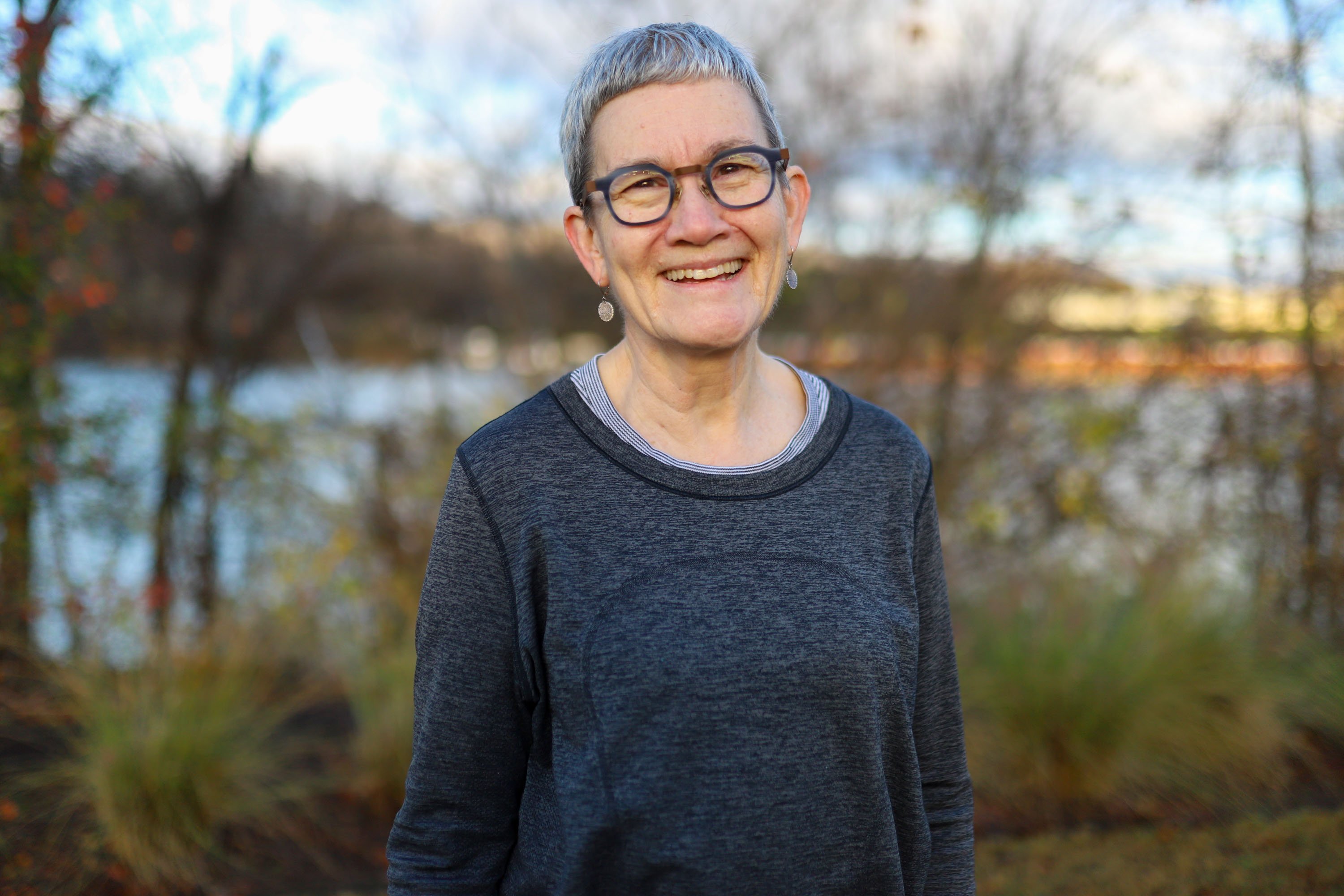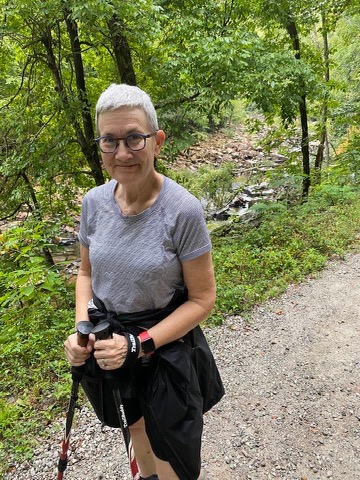Susan Fennema looks like the epitome of health on her morning walks along the Tennessee Riverwalk, a ritual she began after coming to work in Chattanooga in August 2021.
The 65-year-old is an avid runner, watches what she eats and hikes on the weekends. Although heart disease runs in her family, she's been vigilant about checkups with her primary care physician back home in Michigan and keeps her high blood pressure controlled with medication.
Compared to running, Fennema said she didn't think her 2-mile riverfront walks before work did much for her health. But since being rushed to Erlanger Medical Center and undergoing bypass surgery in August, she now believes that simple daily habit saved her life.
"It was as I was doing my regular morning walks that I started having some symptoms that were disturbing and ultimately led me to seek help," she said, noting also that "walking established a level of heart strength that I think carried me through."
In late May -- three weeks after winning her age group at the Valley Fest 5K race in Dunlap, Tennessee -- Fennema noticed her walks getting more difficult.
"There was never any sharp pain, but the 2 miles suddenly seemed far to me," she said as she described feeling only a slight pressure in her chest and an ache in her upper back at the time.
Because she only experienced symptoms while exercising, she wrote them off as lingering effects of a non-COVID-related respiratory illness she came down with after the 5K and the Tennessee heat.
But as summer progressed, she began to feel more strongly that something was wrong.
"I had been (walking) for at least a year at that point and started having even some nausea as though I was exercising really hard," Fennema said. "I remembered reading an article years ago that said women sometimes can even have this sense of doom, and I would say I felt that."
Fennema scheduled a telehealth appointment that led her to seek additional care. Several more doctor visits culminated in Fennema undergoing cardiac catheterization -- a procedure used to diagnose heart conditions by moving a catheter through a blood vessel to the heart.
That procedure revealed that the main artery in her heart -- responsible for 50% of the heart's blood supply and known to cause the infamous widow-maker heart attack -- was 95% blocked. Another major artery in her heart had a 100% blockage, and Fennema needed immediate bypass surgery to reroute her arteries and restore blood and oxygen flow.
Courtney Ayres, chief cardiothoracic physician assistant at Erlanger and part of Fennema's surgical team, said those blockages caused Fennema to experience a milder form of heart attack in which the heart was still receiving some oxygen but not nearly enough.
"She listened to her body, got here in time and there was no major damage to her heart," Ayres said.
Heart disease, an overarching term for diseases that affect the heart or blood vessels, is the No. 1 killer of both men and women in the United States.
Coronary artery disease -- which is caused by plaque buildup in the wall of the arteries limiting blood flow to the heart -- is the most common type of heart disease in the nation, according to the U.S. Centers for Disease Control and Prevention. Although conditions such as high blood pressure, high cholesterol, diabetes and smoking increase one's risk of heart disease, genetics can also play a major role.
Heart attacks can occur when blood flow to the heart is blocked. But unlike men, women rarely experience the "classic" signs of a heart attack, Ayres said.
"Most men come in and say there's a vise grip on their chest, or they get this very tight grip in the center of their chest that goes to their shoulder and down their arm. I would say nine out of 10 women do not ever say that," Ayres said.
(READ MORE: Heart attack deaths jumped sharply among young US adults in 2nd year of COVID pandemic)
Instead, she said women often have more subtle, lesser-known symptoms, such as back pain, a dull stomach ache or indigestion, shortness of breath, jaw clenching or feeling stressed. For these reasons, women often delay needed cardiac care, get the runaround from insurance companies or have their symptoms dismissed by medical providers, Ayres said.
Sometimes, women go through the protocol of receiving an EKG and stress test to assess heart function and appear normal, but further evaluation shows a major blockage, she said, noting that's why it's important to know your body and be persistent if you feel off.
Fennema's surgery took place Aug. 9, and she was discharged from the hospital Aug. 17.
With help from her husband and a walker, she got right back to her morning walks, starting small and going a bit farther each day. Once she was ready to try for 2 miles, she hiked Big Soddy Creek Gulf near Soddy-Daisy on Sept. 3 to celebrate.
"It's one of my favorite, favorite places to go, and it's pretty flat," she said.
Fennema said she hopes sharing her story will help raise awareness around symptoms of heart disease and heart attacks in women and encourage more people to take up daily walks in the new year.
Not only are regular walks a simple way to improve one's health, Fennema said, they can help bring to light underlying health issues that may otherwise go undetected.
"Even if you're just walking around the block, do something," she said. "And listen to your body, you've got to listen."
Contact Elizabeth Fite at efite@timesfreepress.com or 423-757-6673.


